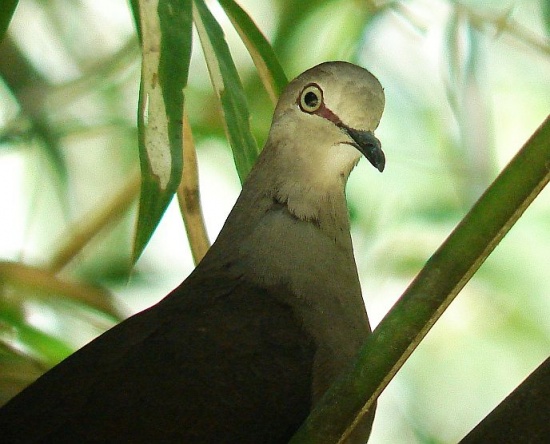(Minor tidy-up. Distribution, Taxonomy. References updated) |
|||
| Line 1: | Line 1: | ||
| + | [[Image:Gray-chested_Dove.jpg|thumb|550px|right|Photo by {{user|Birdingcraft|Patrick O'Donnell}}<br />El Gavilan, Sarapiqui, [[Costa Rica]], May 2009]] | ||
;[[:Category:Leptotila|Leptotila]] cassini | ;[[:Category:Leptotila|Leptotila]] cassini | ||
| − | |||
| − | |||
==Identification== | ==Identification== | ||
| − | As with other ''Leptotila'' species, identification of Gray-chested Dove is based on subtle field marks. Overall, it is darker than sympatric [[White-tipped Dove|White-tipped]] and [[Gray-headed Dove]]s with the dark-gray chest apparent. A close look at the head reveals reddish orbital skin; a field mark lacking in White-tipped Dove but shared with Gray-headed Dove. The dark tones to the plumage of Gray-headed Dove approach those of Gray-chested but Gray-headed has a buffish breast and cheeks. | + | 22·5–28 cm>br /> |
| − | + | As with other ''Leptotila'' species, identification of Gray-chested Dove is based on subtle field marks. Overall, it is darker than sympatric [[White-tipped Dove|White-tipped]] and [[Gray-headed Dove]]s with the dark-gray chest apparent. A close look at the head reveals reddish orbital skin; a field mark lacking in White-tipped Dove but shared with Gray-headed Dove. The dark tones to the plumage of Gray-headed Dove approach those of Gray-chested but Gray-headed has a buffish breast and cheeks. | |
| − | |||
| + | On the southern Pacific slope of Costa Rica and western Panama, Gray-chested Dove also shows a brown patch on the back of the head. | ||
==Distribution== | ==Distribution== | ||
| − | [[ | + | [[Central America|Central]] and [[South America]]<br /> |
| + | '''Central America''': found in [[Mexico]], [[Guatemala]], [[Belize]], [[Honduras]], [[Nicaragua]], [[Costa Rica]] and [[Panama]]<br /> | ||
| + | '''South America''': occurs only in [[Colombia]] | ||
==Taxonomy== | ==Taxonomy== | ||
| − | Three subspecies are recognized<sup>[[#References|[1]]]</sup>: ''cassini'', '' | + | ====Subspecies==== |
| + | Three subspecies are recognized<sup>[[#References|[1]]]</sup>: | ||
| + | *''L, c. cassini'': | ||
| + | :*[[Panama]] (Canal Zone) to northern [[Colombia]] (Cauca-Magdalena area) | ||
| + | *''L, c. rufinucha'': | ||
| + | :*South-western [[Costa Rica]] to north-western Panama (Chiriquí) | ||
| + | *''L, c. cerviniventris'': | ||
| + | :*Caribbean lowlands of [[Guatemala]] to western Panama | ||
==Habitat== | ==Habitat== | ||
Humid forest undergrowth and edge from lowlands to 1,200 meters. | Humid forest undergrowth and edge from lowlands to 1,200 meters. | ||
| − | |||
==Behaviour== | ==Behaviour== | ||
| − | Forages on ground in shady undergrowth. | + | Forages on ground in shady undergrowth, singly or in pairs. |
| + | ====Diet==== | ||
| + | There is little recorded about their diet, but they are thought to eat seeds and insects. | ||
==References== | ==References== | ||
| − | # | + | #{{Ref-Clements6thAug13}}#Avibase |
| − | + | #Handbook of the Birds of the World Alive (retrieved June 2014) | |
| + | #BF Member observations | ||
| + | {{ref}} | ||
==External Links== | ==External Links== | ||
{{GSearch|Leptotila+cassini}} | {{GSearch|Leptotila+cassini}} | ||
[[Category:Birds]] [[Category:Leptotila]] | [[Category:Birds]] [[Category:Leptotila]] | ||
Revision as of 22:03, 14 June 2014
- Leptotila cassini
Identification
22·5–28 cm>br /> As with other Leptotila species, identification of Gray-chested Dove is based on subtle field marks. Overall, it is darker than sympatric White-tipped and Gray-headed Doves with the dark-gray chest apparent. A close look at the head reveals reddish orbital skin; a field mark lacking in White-tipped Dove but shared with Gray-headed Dove. The dark tones to the plumage of Gray-headed Dove approach those of Gray-chested but Gray-headed has a buffish breast and cheeks.
On the southern Pacific slope of Costa Rica and western Panama, Gray-chested Dove also shows a brown patch on the back of the head.
Distribution
Central and South America
Central America: found in Mexico, Guatemala, Belize, Honduras, Nicaragua, Costa Rica and Panama
South America: occurs only in Colombia
Taxonomy
Subspecies
Three subspecies are recognized[1]:
- L, c. cassini:
- L, c. rufinucha:
- South-western Costa Rica to north-western Panama (Chiriquí)
- L, c. cerviniventris:
- Caribbean lowlands of Guatemala to western Panama
Habitat
Humid forest undergrowth and edge from lowlands to 1,200 meters.
Behaviour
Forages on ground in shady undergrowth, singly or in pairs.
Diet
There is little recorded about their diet, but they are thought to eat seeds and insects.
References
- Clements, J. F., T. S. Schulenberg, M. J. Iliff, B.L. Sullivan, C. L. Wood, and D. Roberson. 2013. The eBird/Clements checklist of birds of the world: Version 6.8., with updates to August 2013. Downloaded from http://www.birds.cornell.edu/clementschecklist/download/
- Avibase
- Handbook of the Birds of the World Alive (retrieved June 2014)
- BF Member observations
Recommended Citation
- BirdForum Opus contributors. (2024) Gray-chested Dove. In: BirdForum, the forum for wild birds and birding. Retrieved 11 May 2024 from https://www.birdforum.net/opus/Gray-chested_Dove




